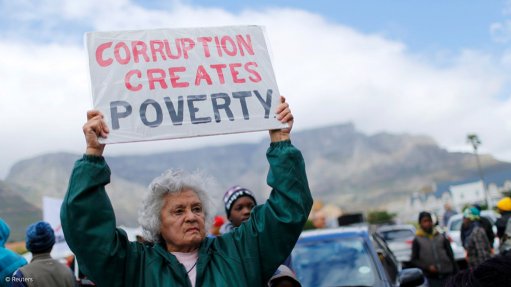Russia’s Africa infowars
Outrage is one of the criteria media outlets use when selecting the news to include in their coverage. The Russian embassy in South Africa appears to be alive to this, which seems to explain why, back in July, it posted on its website what it said was a screenshot from US newspaper Politico under the headline ‘20 000 000 lives for the sake of freedom’.
In comments accompanying the ‘screenshot’, the embassy stated that the North Atlantic Treaty Organisation “is pushing a war to be fought until the last Ukrainian” – a clear attempt to cast the Western military alliance as the villain of the piece in the Russia-Ukraine conflict, which has been raging since February 2022.
That the screenshot – which has since been deleted – was fake was not too difficult to detect; the bad grammar and spelling errors, as well as shoddy reproduction of the Politico logo, were screaming giveaways.
The embassy’s poor attempt at swaying South African public opinion in favour of Russia, despite its aggression in Ukraine, is but one episode in an intensifying continent-wide disinformation campaign.
But why Africa? Having been estranged from the Western world in the aftermath of its invasion of Ukraine, Russia is desperate for diplomatic legitimacy for its actions in its much smaller and militarily weaker neighbour, and African countries where internal checks and balances are weak provide an environment where Russia can exercise influence. In the main, such countries are themselves international pariahs and are therefore likely to embrace Russia’s advances.
As one commentator explained in an op-ed last month, after the military staged coups in several West African countries in the past two-and-a-half years, leveraging anger towards former colonial power France’s political and military activities in the region, they hastened to ban French media from operating within their borders. This cut off credible media coverage in those countries, and Russia-aligned actors quickly stepped in, effectively launching a diplomatic campaign.
The actors have included dishonest pundits. One such commentator, who is quite prominent in Mali, was quoted on various media platforms in February as saying Russian military instructors were “100% trusted” by the population. “Down to the last peasant in the last village, if you ask them, who’s working in the best interests of Africans, they will say Russia,” he told an interviewer, adding that the Russians had done more to fight off jihadists in less than a year than France had in about a decade.
This dishonest pundit, of course, chose to be mum about the excesses – including killings – of mercenaries working for the Wagner Group, which is linked to the Kremlin. Africa analysts aver that this pro-Russia influencer and his ilk, some of whom may well be on the Russian government’s payroll, are tapping into genuine frustrations and sympathies to justify Russia’s version of events. Memories of the financial and military support that the former Union of Soviet Socialist Republics extended to African liberation movements also help the Russian cause.
Russia’s disinformation onslaught in Africa – and elsewhere – has relied heavily on social media platforms, with a study conducted for the European Union Commission, the results of which were published in September, stating: “The reach of pro-Kremlin accounts increased between January and May of 2023, with average engagement rising by 22% across online platforms. However, this increased reach was largely driven by Twitter (which has since been rebranded as X), where engagements grew by 36% after CEO Elon Musk decided to lift mitigation measures on Kremlin-backed accounts, arguing that ‘all news is, to some degree, propaganda.’”
Besides X, pro-Russia propagandists also make use of Meta, TikTok and YouTube quite extensively.
Worryingly, Russia’s success in reaching a significant African audience online with little overhead seems to be inspiring other foreign governments, with the Chinese, for example, also involved. Domestic actors, too, are hopping on the bandwagon for political ends.
Illustrating how widespread the situation has become, a highly regarded international think-tank documented 50 disinformation campaigns on the continent in 2022. The split between externally and domestically driven campaigns was 60:40.
That’s not good for democracy.Article Enquiry
Email Article
Save Article
Feedback
To advertise email advertising@creamermedia.co.za or click here
Comments
Press Office
Announcements
What's On
Subscribe to improve your user experience...
Option 1 (equivalent of R125 a month):
Receive a weekly copy of Creamer Media's Engineering News & Mining Weekly magazine
(print copy for those in South Africa and e-magazine for those outside of South Africa)
Receive daily email newsletters
Access to full search results
Access archive of magazine back copies
Access to Projects in Progress
Access to ONE Research Report of your choice in PDF format
Option 2 (equivalent of R375 a month):
All benefits from Option 1
PLUS
Access to Creamer Media's Research Channel Africa for ALL Research Reports, in PDF format, on various industrial and mining sectors
including Electricity; Water; Energy Transition; Hydrogen; Roads, Rail and Ports; Coal; Gold; Platinum; Battery Metals; etc.
Already a subscriber?
Forgotten your password?
Receive weekly copy of Creamer Media's Engineering News & Mining Weekly magazine (print copy for those in South Africa and e-magazine for those outside of South Africa)
➕
Recieve daily email newsletters
➕
Access to full search results
➕
Access archive of magazine back copies
➕
Access to Projects in Progress
➕
Access to ONE Research Report of your choice in PDF format
RESEARCH CHANNEL AFRICA
R4500 (equivalent of R375 a month)
SUBSCRIBEAll benefits from Option 1
➕
Access to Creamer Media's Research Channel Africa for ALL Research Reports on various industrial and mining sectors, in PDF format, including on:
Electricity
➕
Water
➕
Energy Transition
➕
Hydrogen
➕
Roads, Rail and Ports
➕
Coal
➕
Gold
➕
Platinum
➕
Battery Metals
➕
etc.
Receive all benefits from Option 1 or Option 2 delivered to numerous people at your company
➕
Multiple User names and Passwords for simultaneous log-ins
➕
Intranet integration access to all in your organisation


















